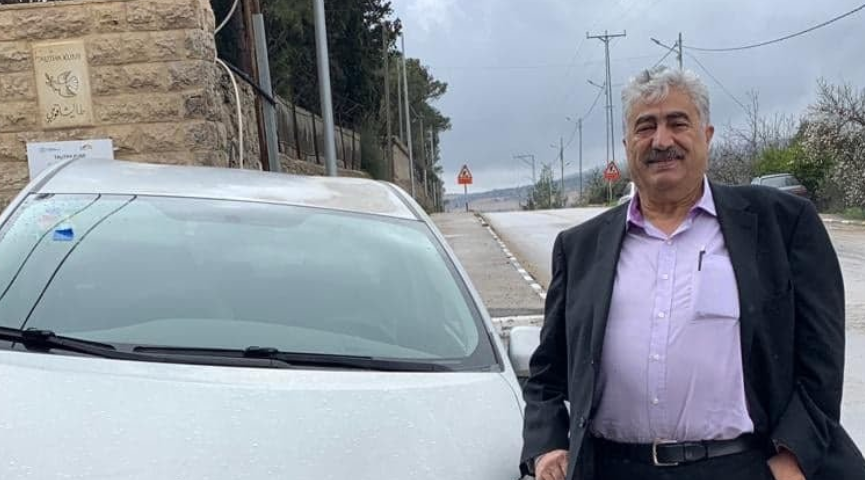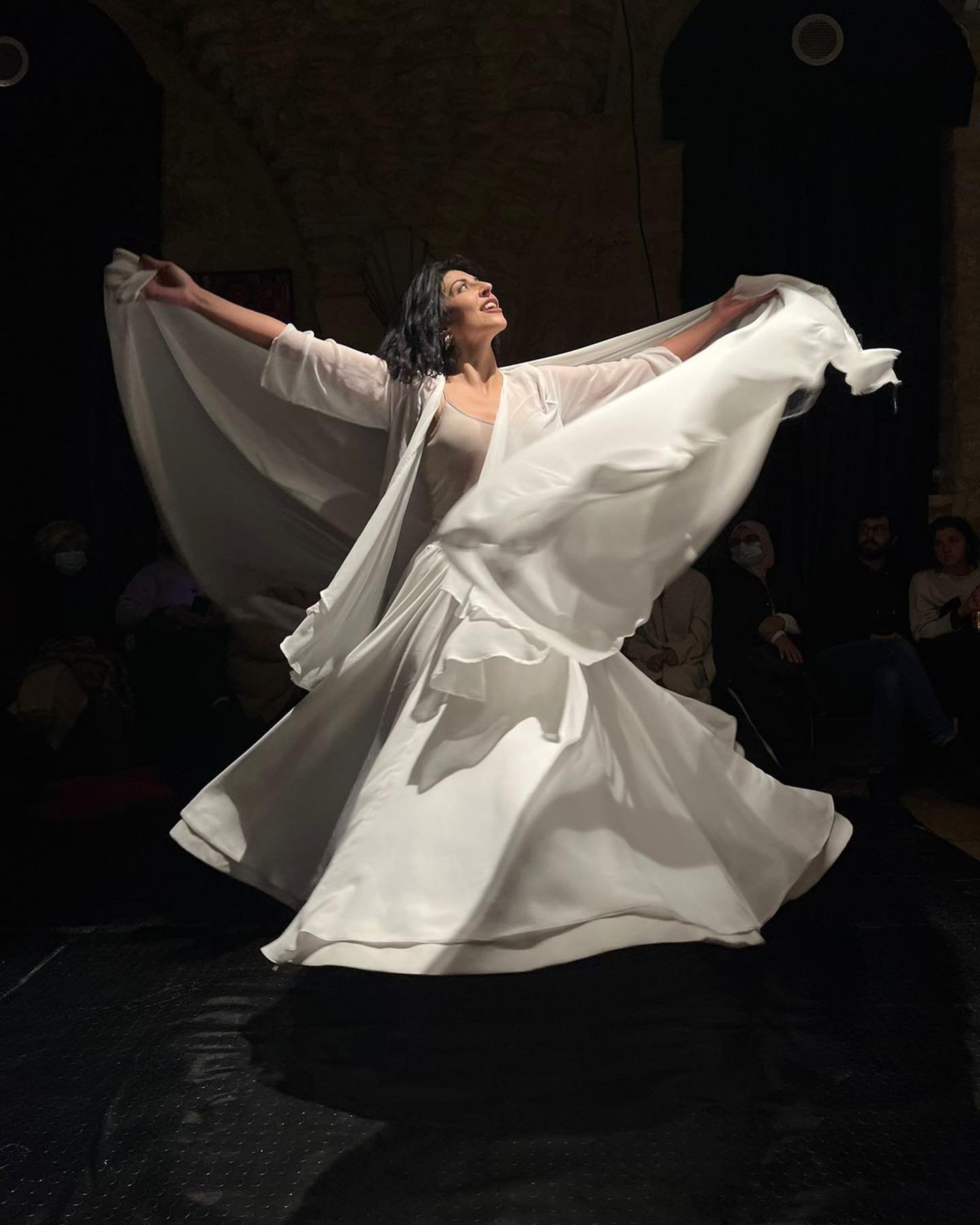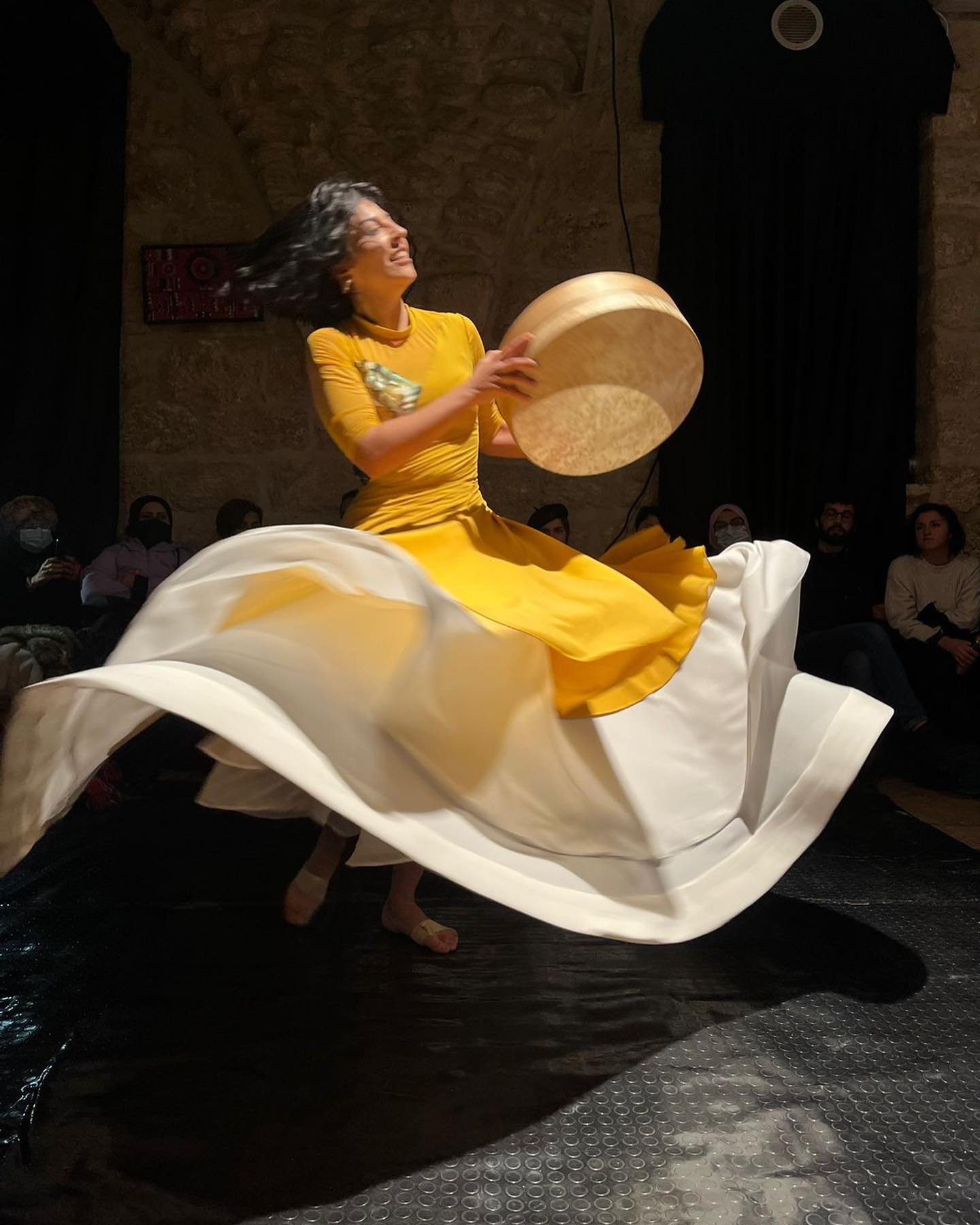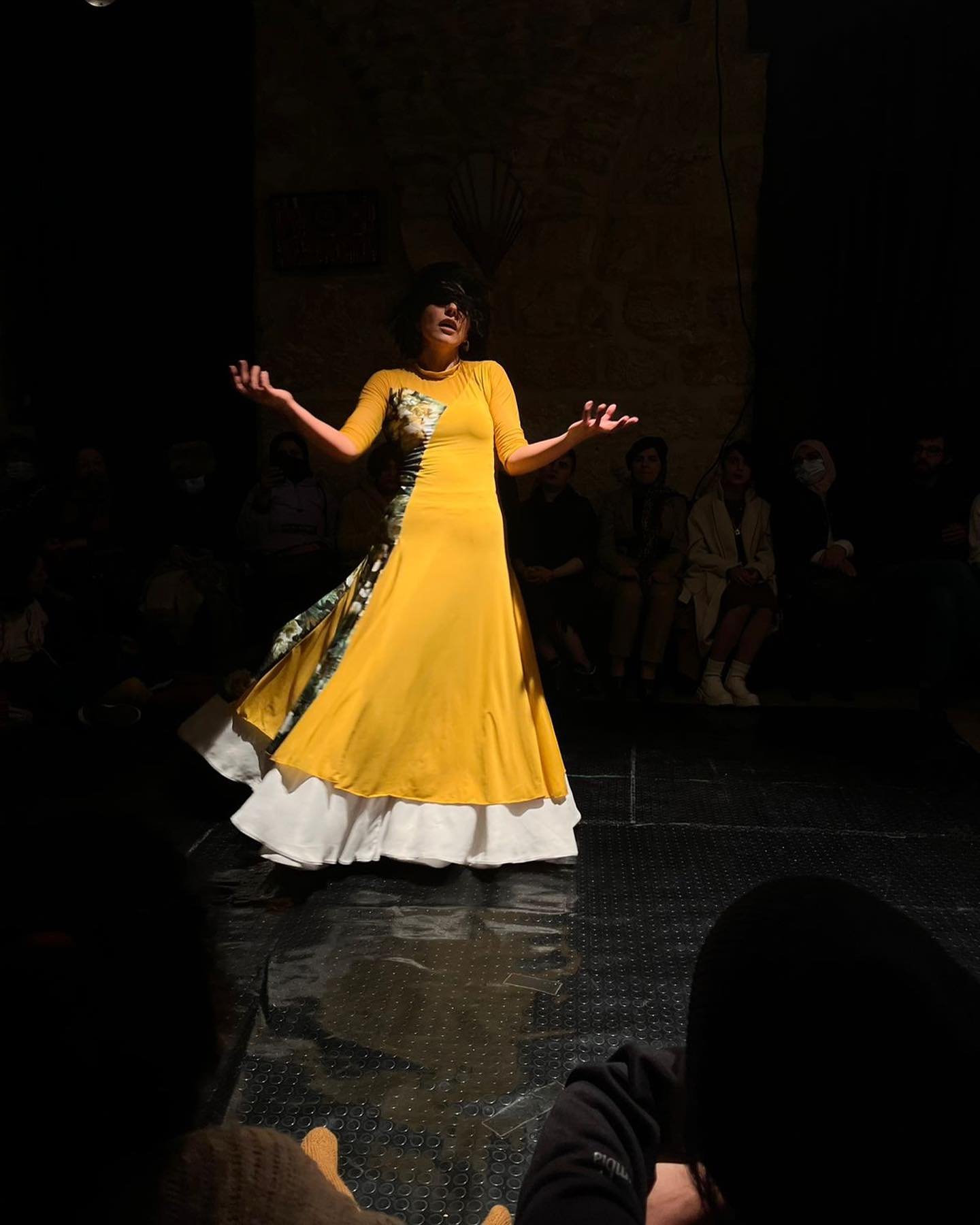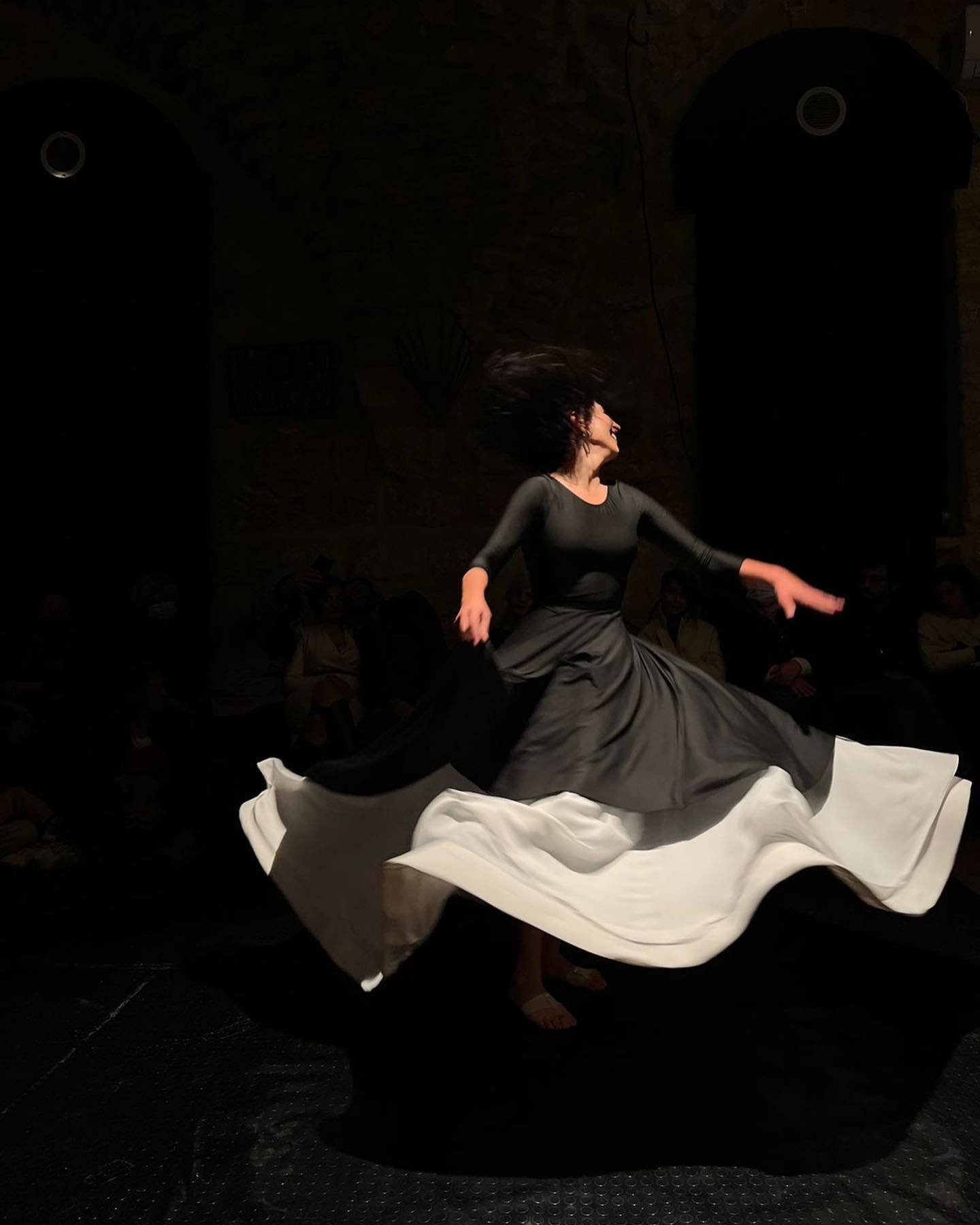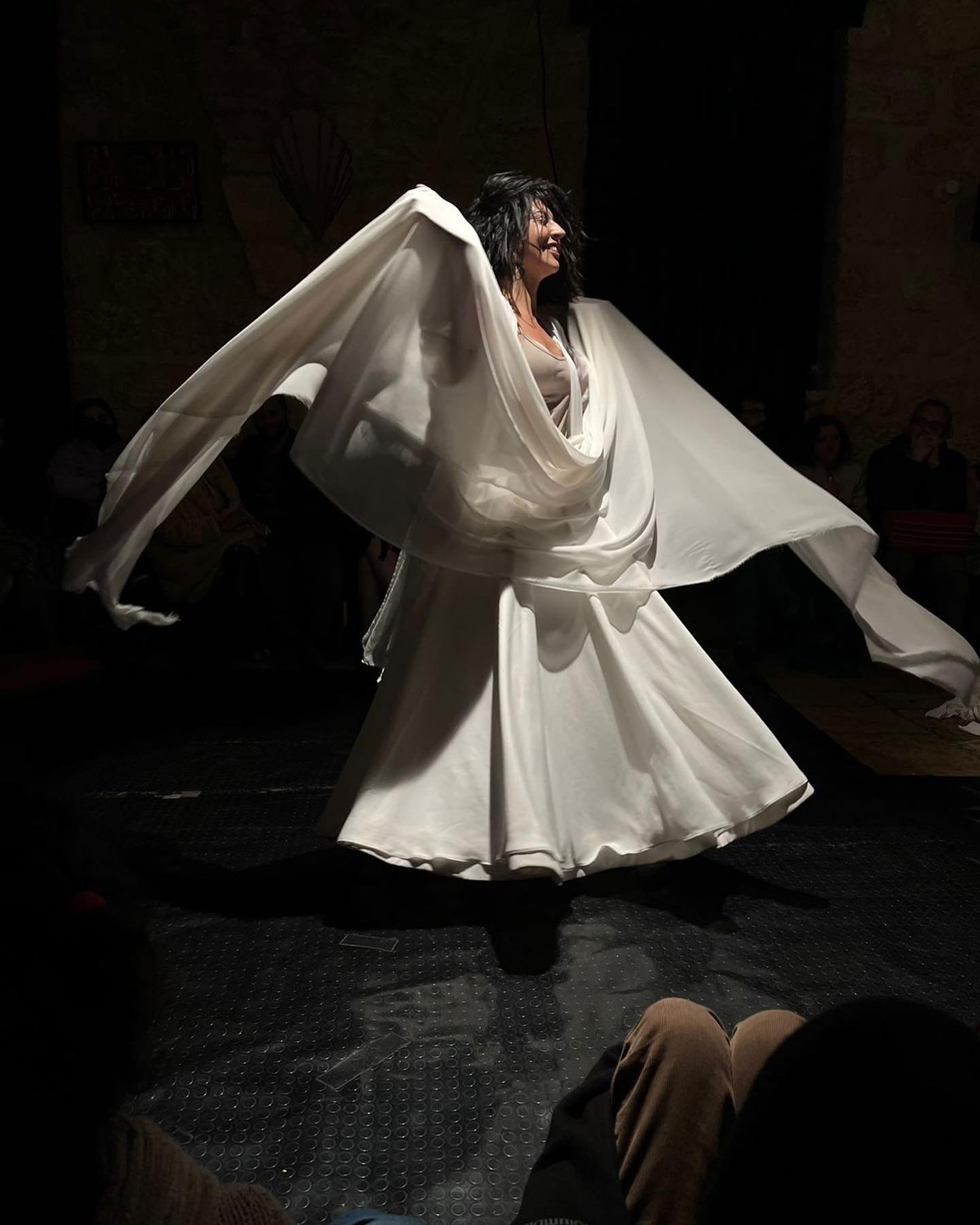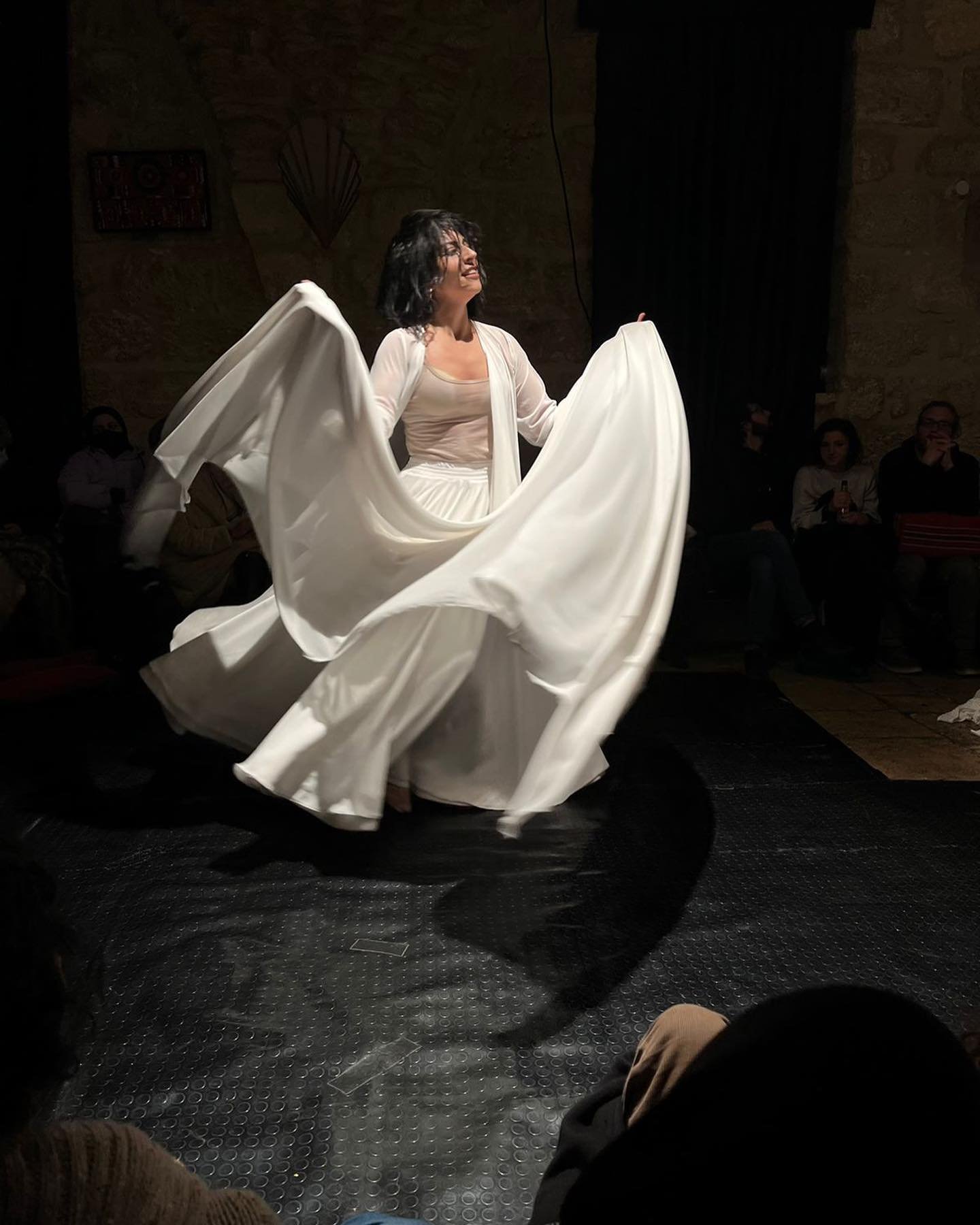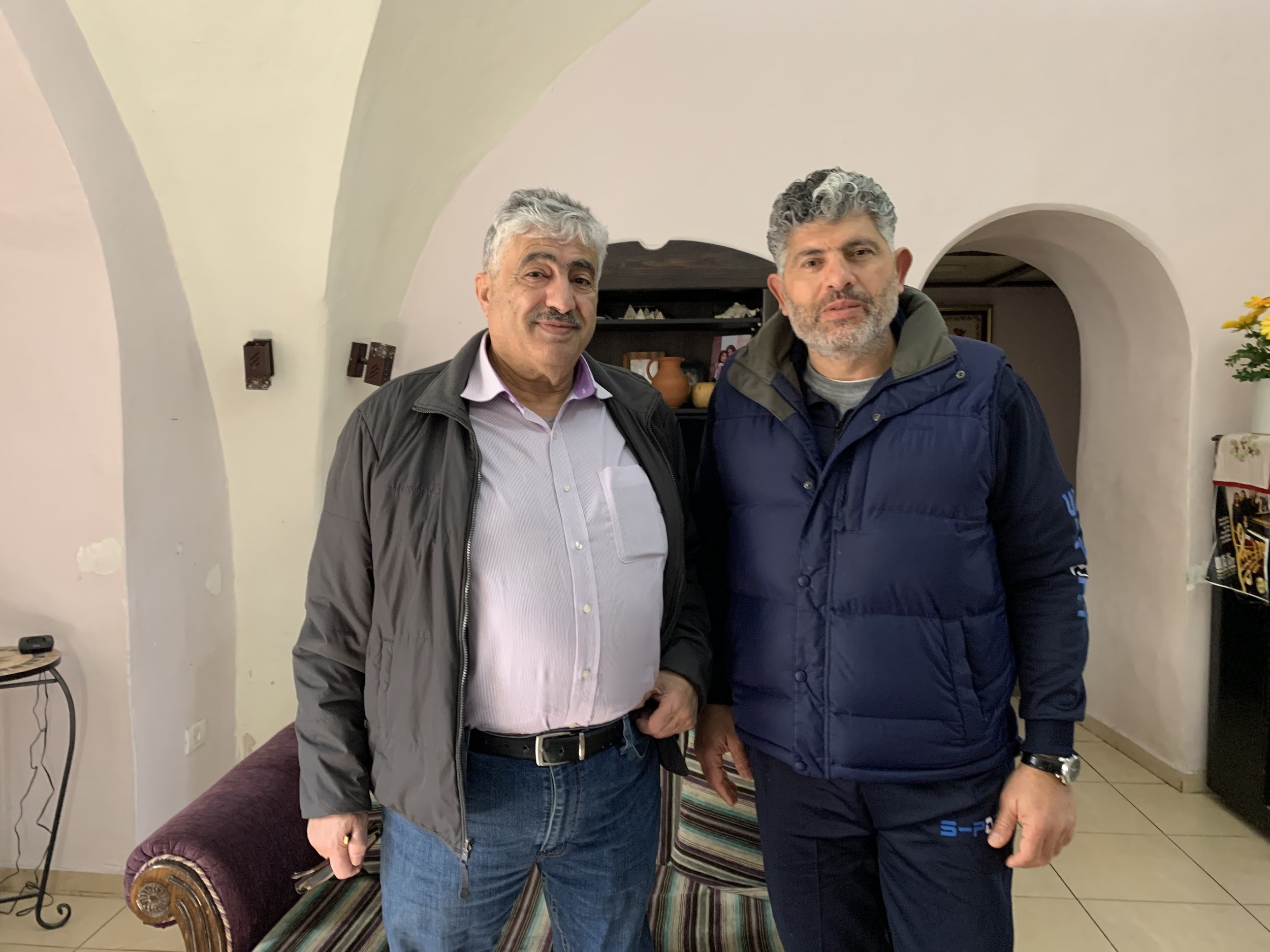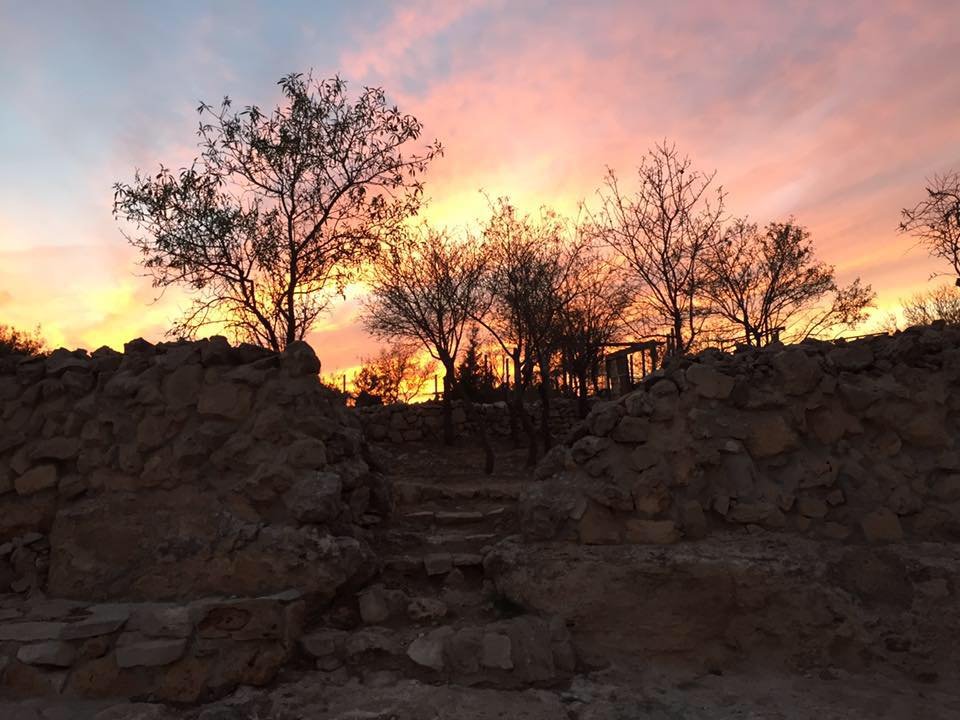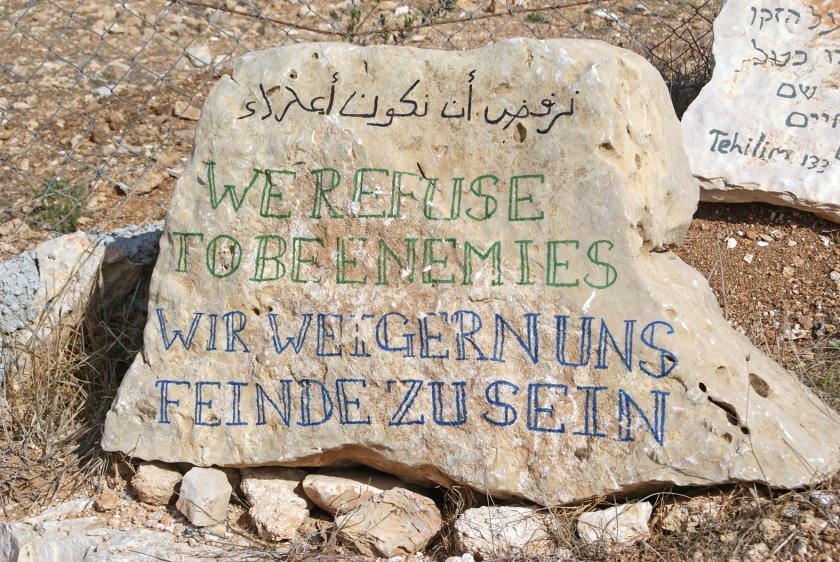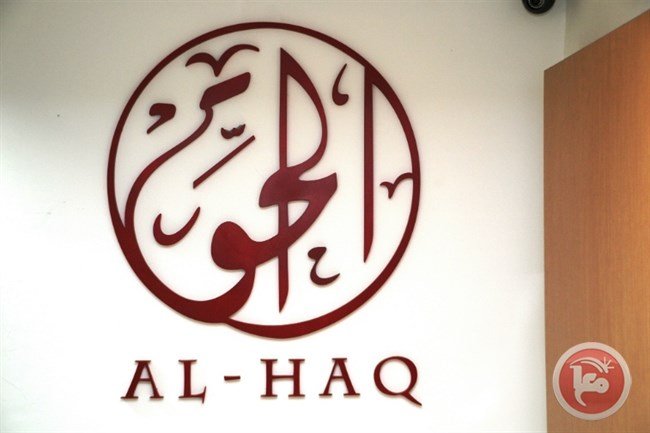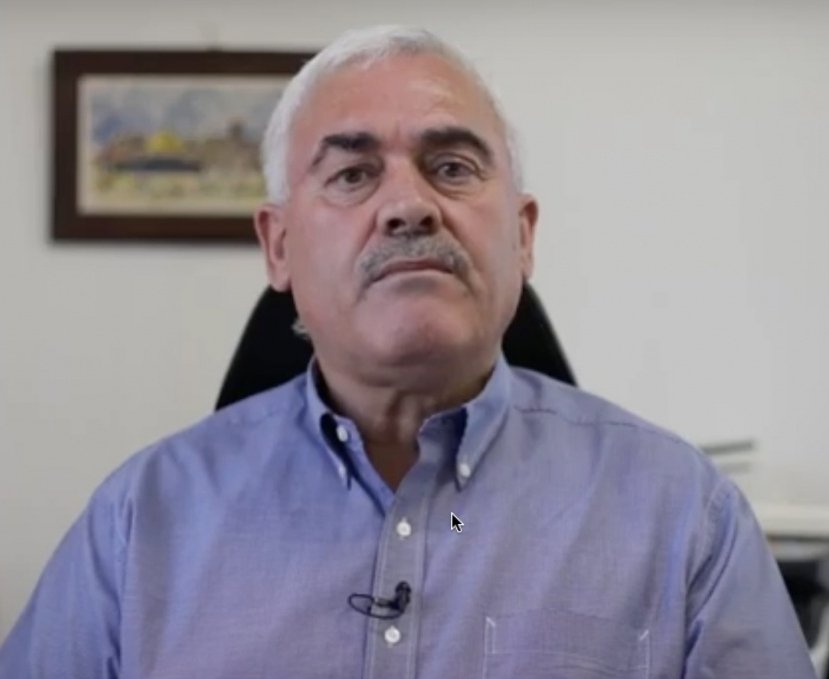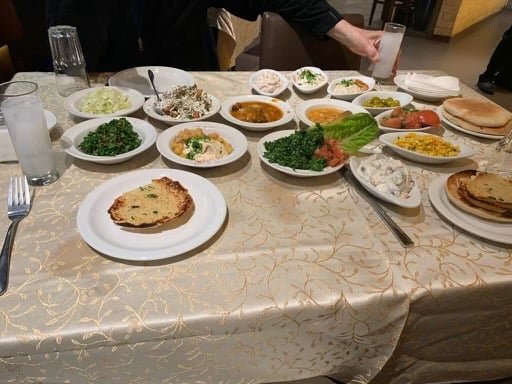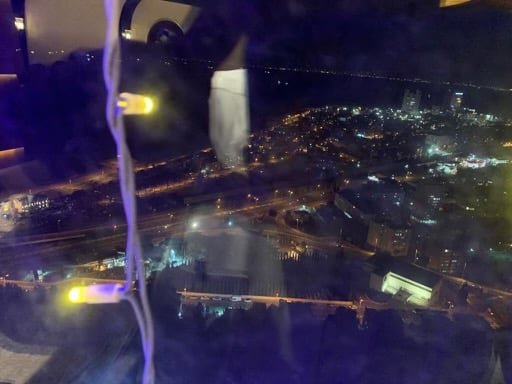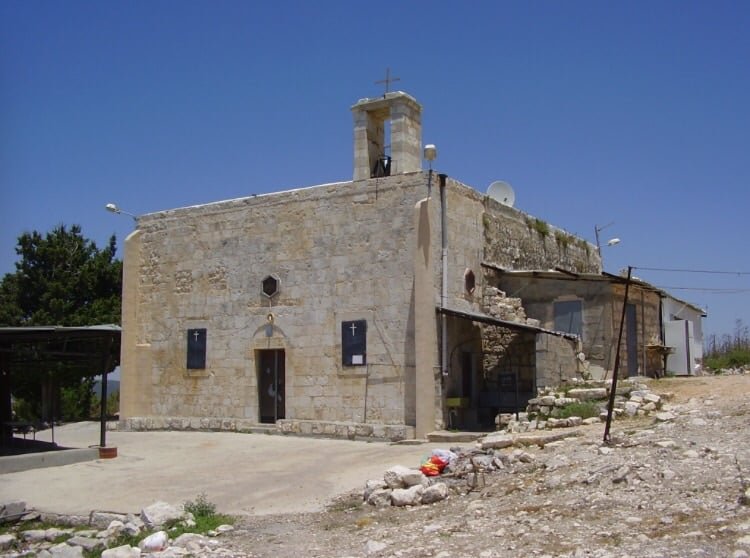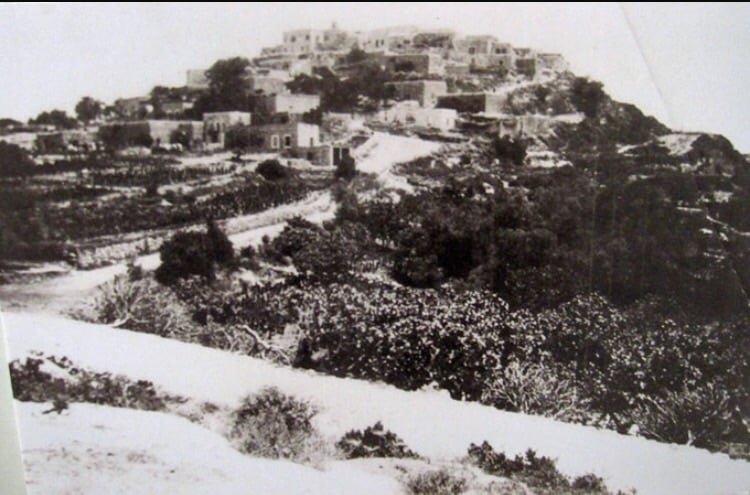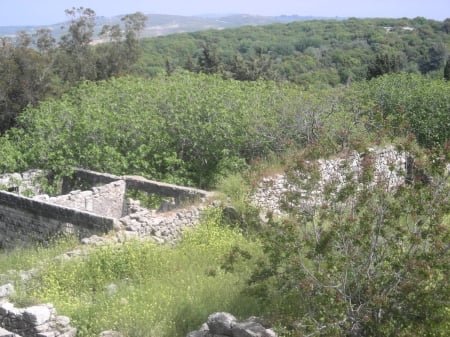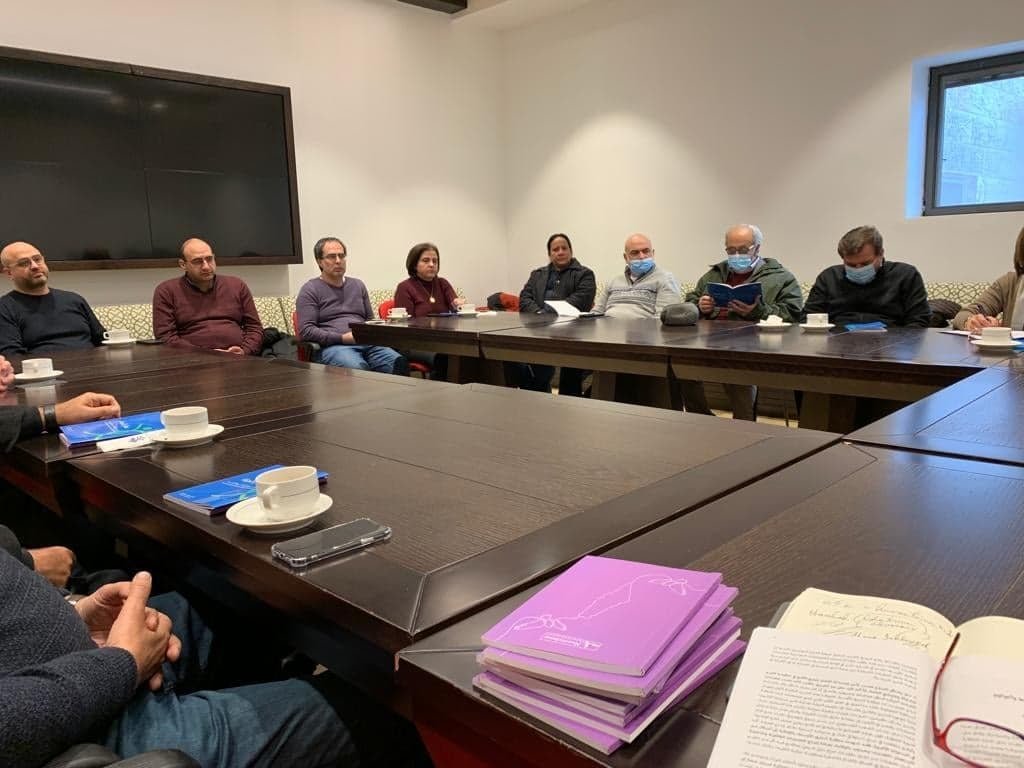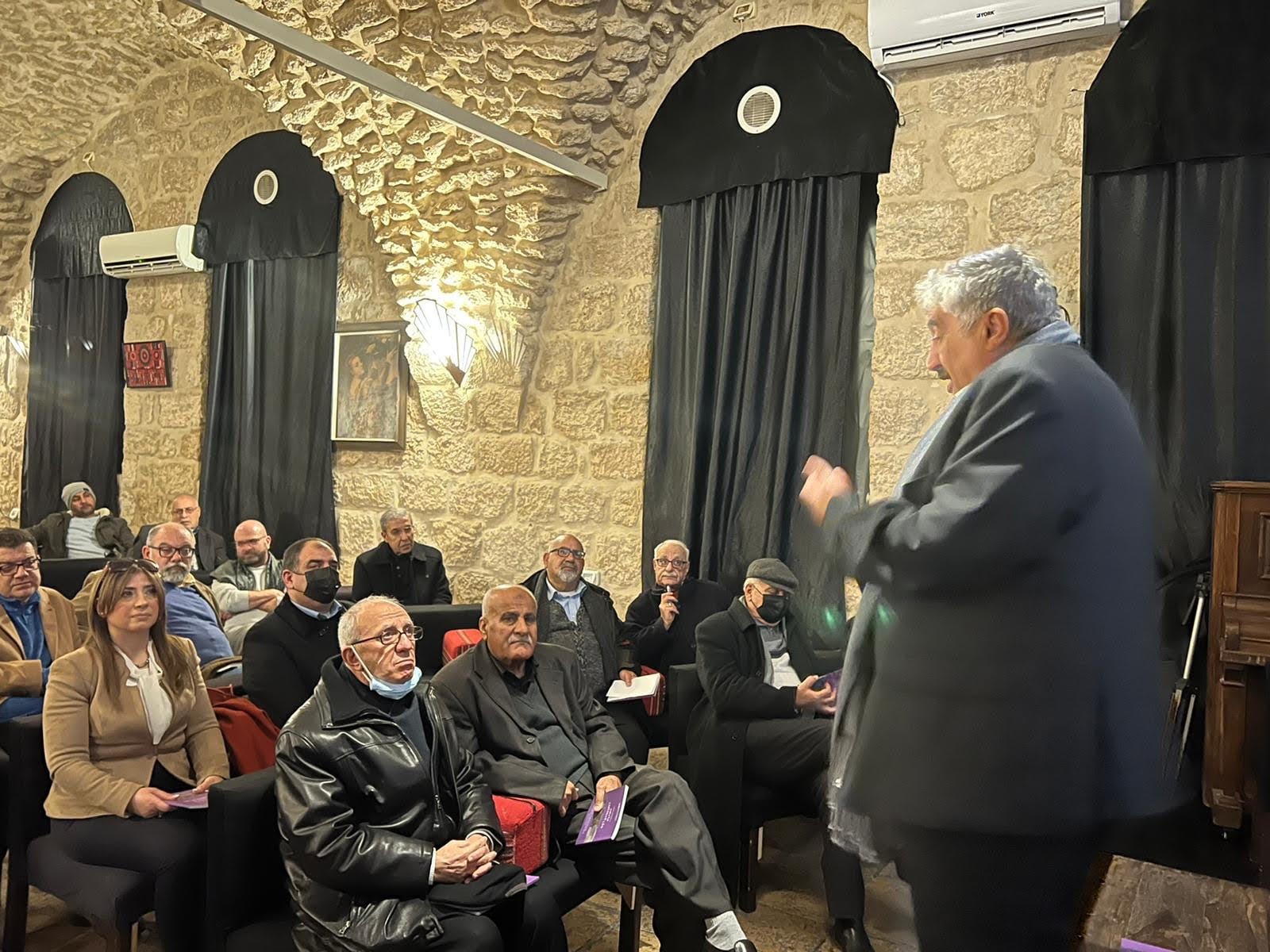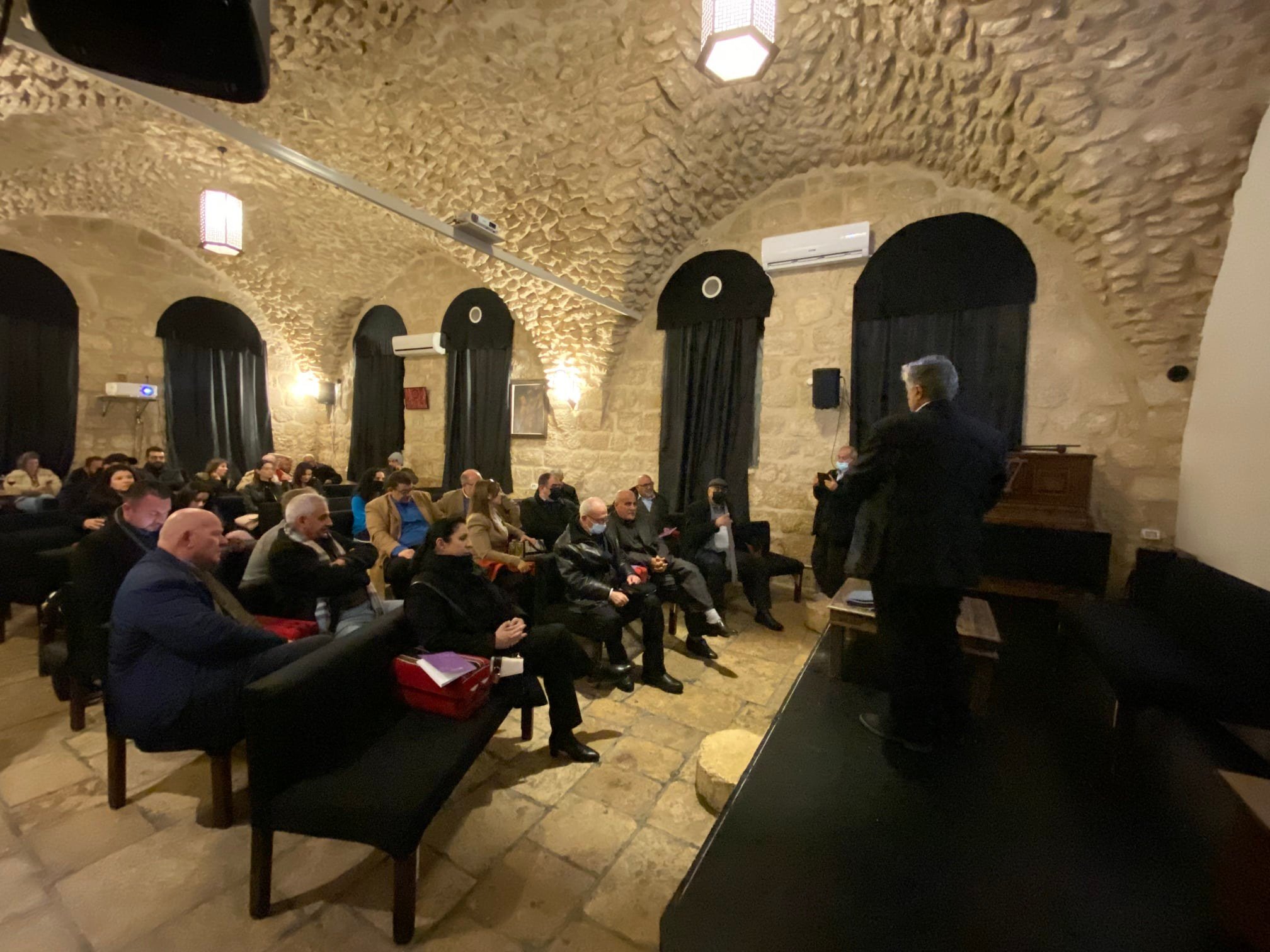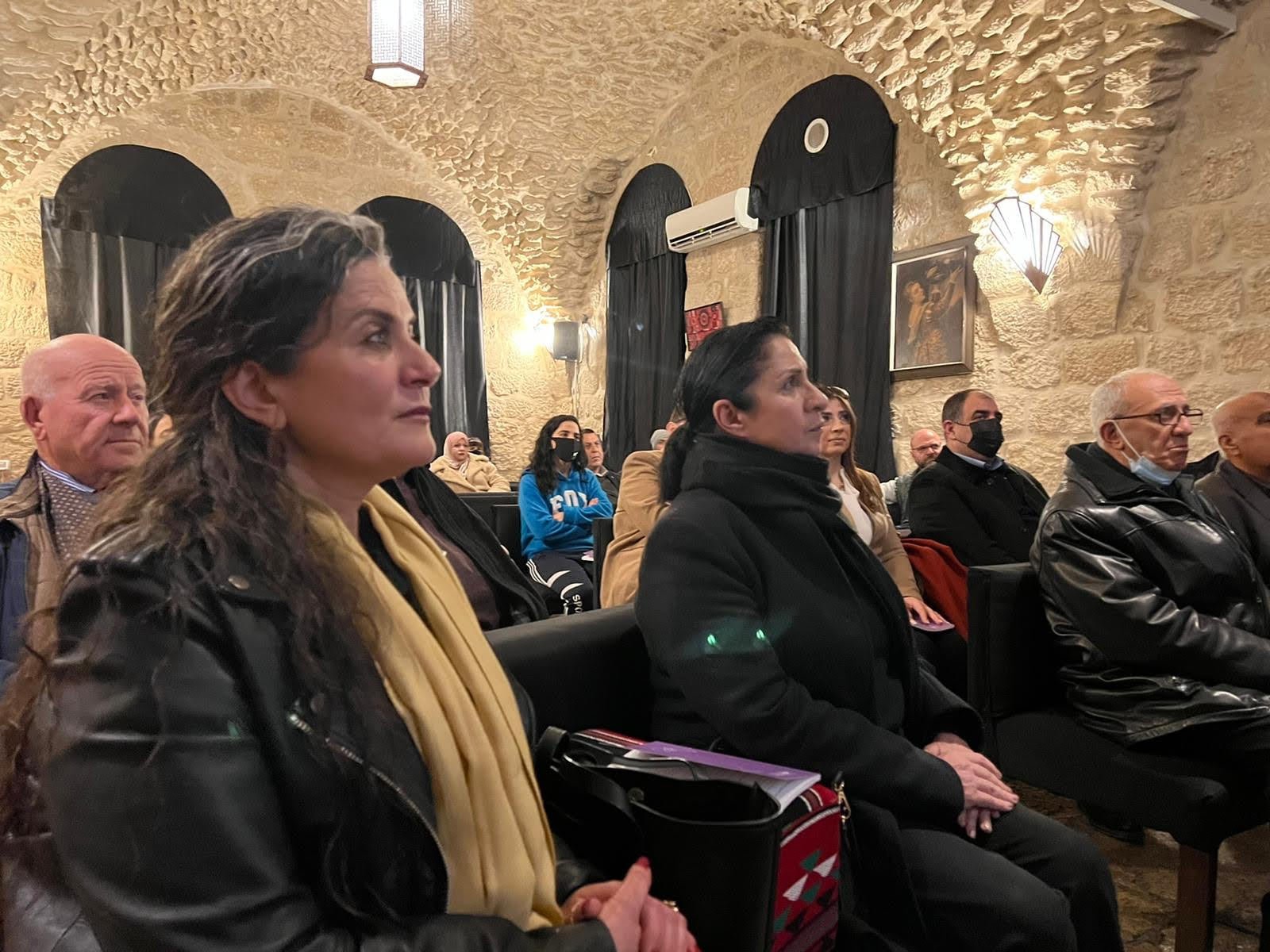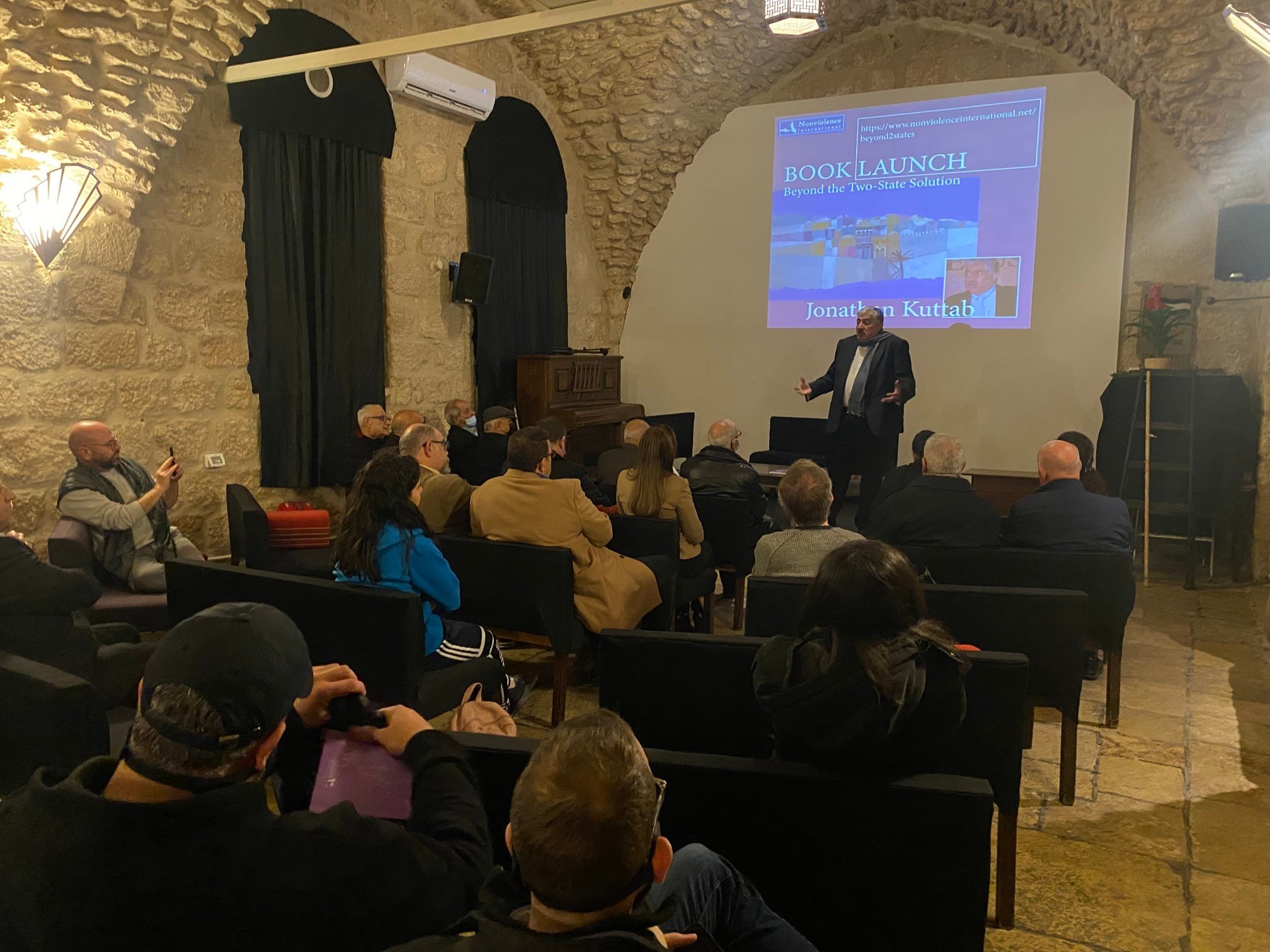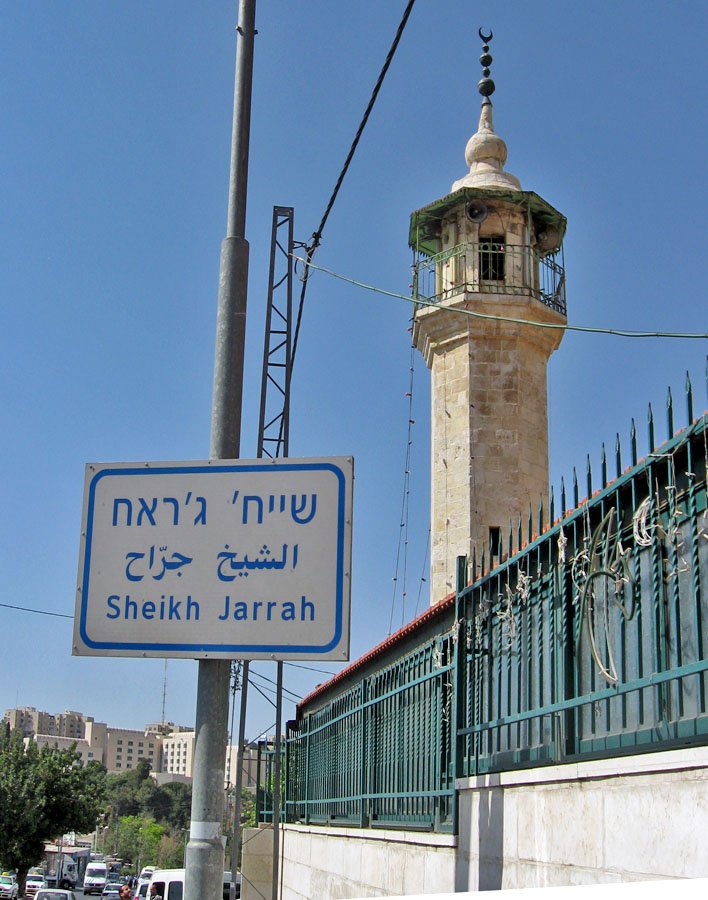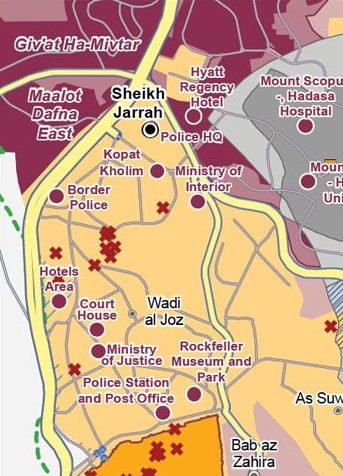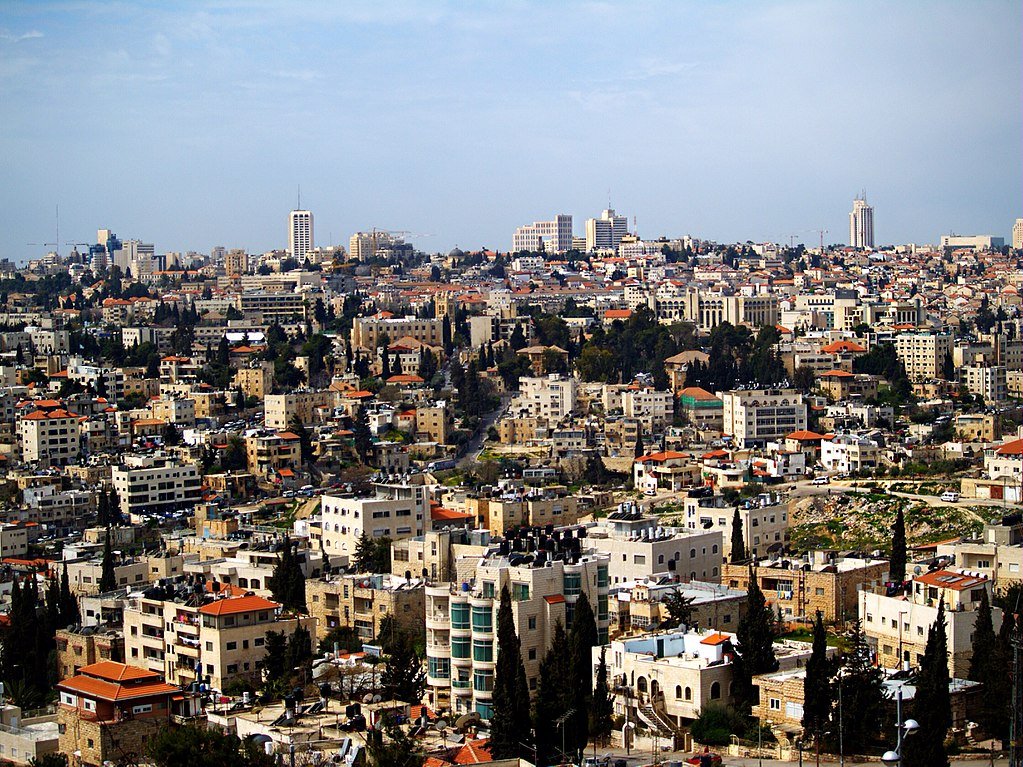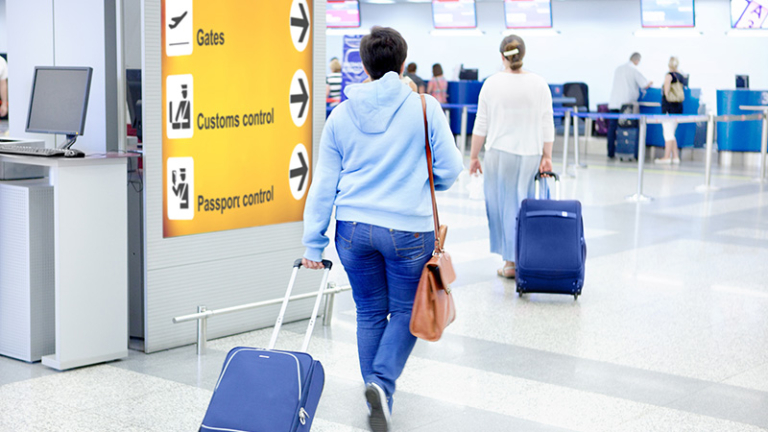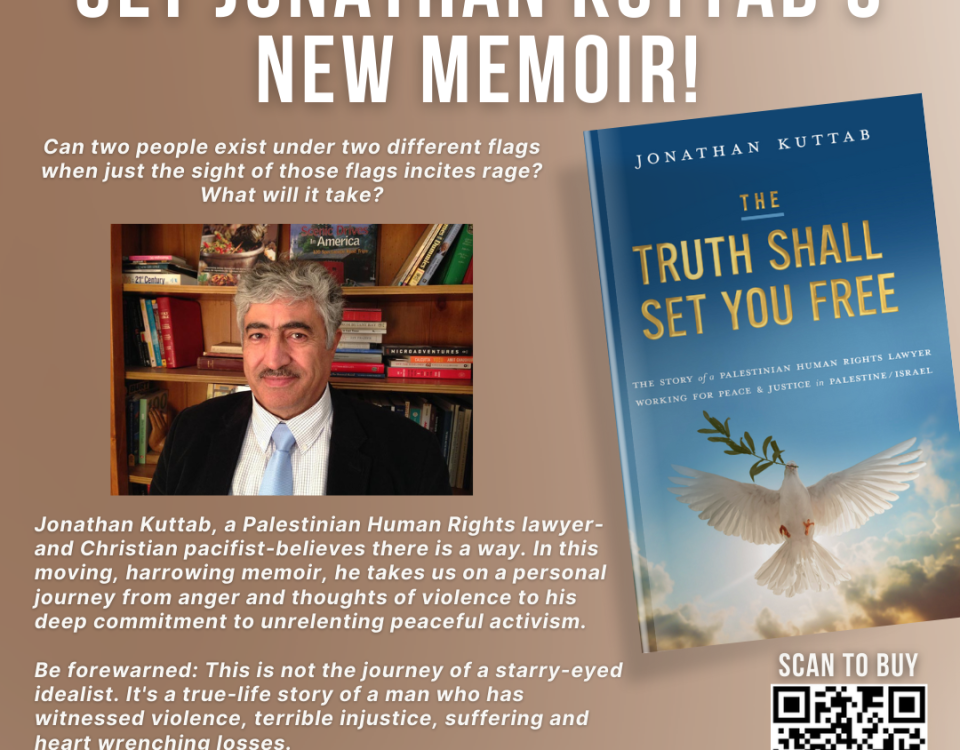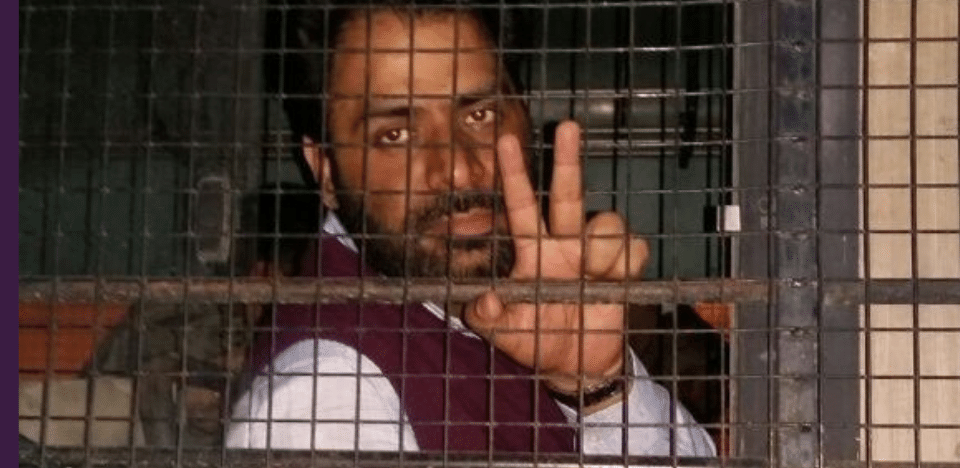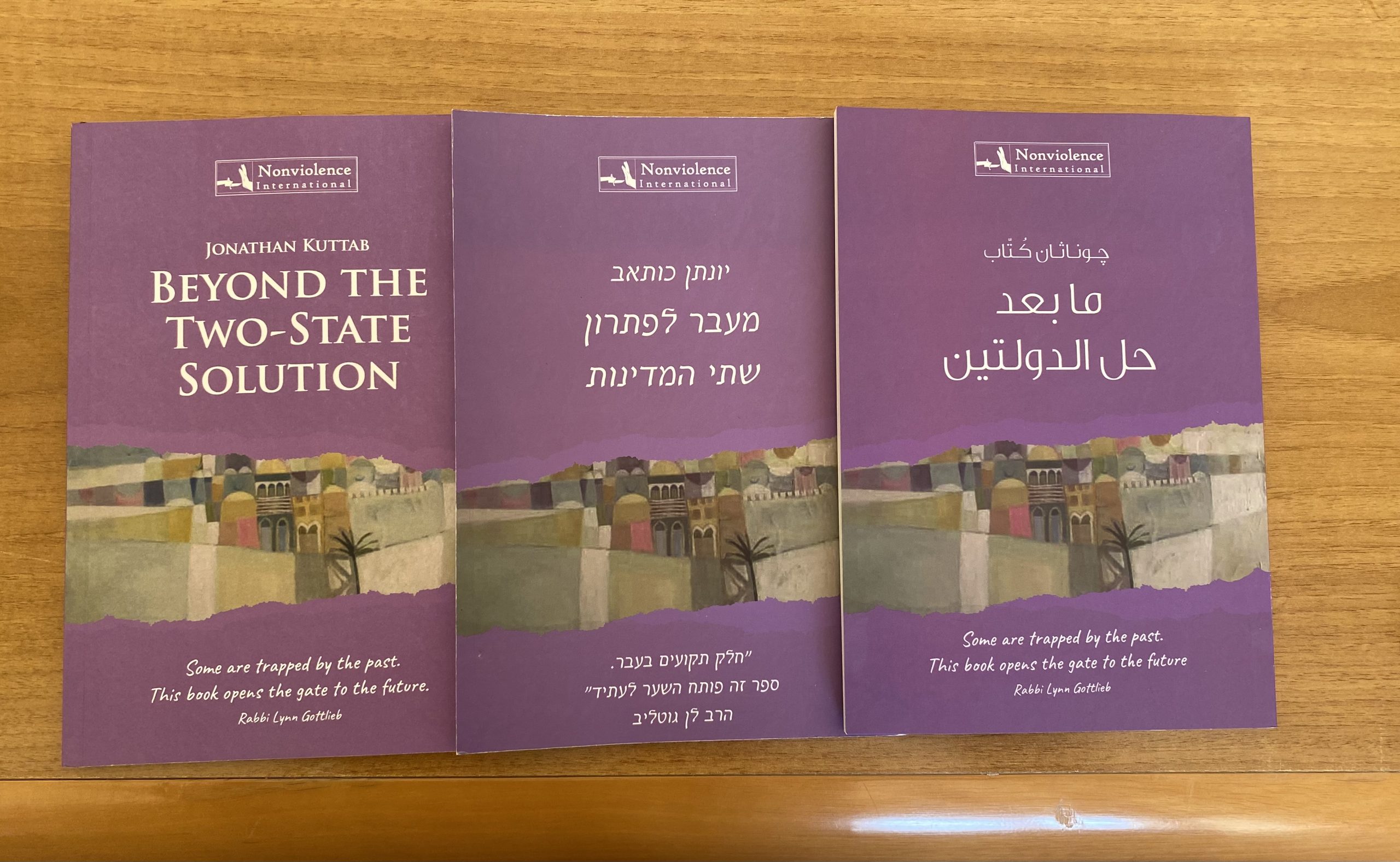
Beyond the Two-State Solution, now available in Arabic & Hebrew
February 23, 2022Jonathan Kuttab joins webinar “What about Hamas?”
March 11, 2022#Beyond2States
#KeepingUpWithKuttab
Initially published by Friends of Sabeel North America (FOSNA), where Jonathan Kuttab is the Executive Director.
https://www.fosna.org/the-fosna-blog/journeywithjonathan-kuttabinpalestine-beyond2states-keepingupwithkuttab
The following are blogs from Jonathan Kuttab during time in February 2022 in Palestine.
#1

Our Executive Director, Jonathan Kuttab, has just touched down in Palestine. We have some very exciting meetings coming up with grass-roots organizations in Palestine. We hope that this trip can change the conversation on Palestine/Israel, and that we can face the new reality in Palestine: one where the two-state solution is no longer on the table, unfortunately. While this trip is to promote his book “Beyond the Two-State Solution,” Jonathan will be meeting with some important people, and we cannot wait to share more on his trip.
Some words from Jonathan: “Arrived safely and checked in. While still jetlagged, started with a wonderful meal at the home of Bishara and Salwa Awad, where I ate Musakhan and had a lengthy discussion with Andrew Bush, the new head of the Bethlehem Bible College’s Peace Institute. Taking a cup of coffee to help me sleep as soon as I return to the hotel. Peace.”
#2

Update from Jonathan: I could not sleep well after my flight and woke up at 3:30 AM (Palestine time)! So, I started reading my colleague Jesse’s new book, Serving a Crucified King: Meditations on Faith, Politics, and the Unyielding Pursuit of God’s Reign. He had given me two copies to take to both the Bethlehem Bible College and Sabeel Jerusalem libraries.
It is really good!!!! Without calling it liberation theology, he did a wonderful job of explaining the relationship between faith and the commitment to justice, which is at the root of Palestinian Liberation Theology, and he said it in a way that is easy to accept especially for conservative Christians. The book is a series of 50 short meditations/devotionals that invite Christians to consider how their faith should impact their politics. I will be mailing copies of it, when I return, to friends.
A big part of my task here is promoting the Arabic and Hebrew translations of my book, Beyond the Two-State Solution, but I definitely want to do what I can to promote Jesse’s book to FOSNA and friends.
#3
Last night, I went to a fascinating show in Beit Sahour at the “castle” in the old city. It featured a female Sufi Whirling Darwish Dancer, doing modern Whirling Dances and interpretive dances, to the music in guitar and song of a Palestinian singer from Nazareth.
It was a fascinating show!! I was familiar with Whirling Darwishes, but did not know they could be female, and I had never encountered them in Palestine before.
The main feature was a haunting cry for female liberation, in a poem by a woman from the Galilee. It recounted the story of a little girl who grew up loving dancing, but who was constrained by conservative society and told that dancing was a sin, until she rebelled and used dancing as a worshipful prayer to God, in the Sufi tradition, praising Him and achieving liberation at the same time. The audience and I were so caught up in the spiritual nature of the act that we felt we could not even applaud at the end of the first feature, as it would be almost sacrilegious.
It was quite impressive to see young people, despite the occupation and despite the depressed economy of Beit Sahour (which was devastated by the absence of tourism due to Corona) still expressing and enjoying creativity and art. It was also nice to see the obvious unity of Palestinians from the Galilee and the West Bank–interacting together even though they live under different legal systems dictated by Israel: Some are citizens of Israel, trying to achieve equality in a state that officially calls itself Jewish and views them with hostility and discrimination, while others are living under military occupation, with no prospect for independence and statehood. Yet both share the same nationality and culture.
#4

Today, I visited Bethlehem Bible College, where I am a member of the Board. I met with Andrew Bush, the head of BBC’s Peace and Justice Institute. We taped a 30-minute interview about my book, Beyond the Two State Solution, which will be posted on their YouTube channel and sent out to all their constituencies. BBC is now offering an accredited online Masters’ Degree programme in English, the MA in Peace and Justice in the Palestinian Context. More details about this program will be available soon. Finally, please check back for updates regarding Daoud Nassar and the Tent of Nations.
#5
Those who follow FOSNA on social media may know that I am currently traveling throughout Palestine (#JourneyWithJonathan). Yesterday, I had an opportunity to visit the Tent of Nations farm. Today, I visited Daoud Nassar at his home in Bethlehem, where he has been recovering from the violent assault against him about which I wrote last week. He appears to be recovering well and was deeply grateful for the concern and prayers he has received from many friends all over the world. He is gratified by the fact that the Palestinian Authority seems to be taking some action, with even Palestinian President Mahmoud Abbas calling to express concern. In addition, the Mayor and Town Council of Nahhalin, the village from which the attackers came, visited him to express concern and show solidarity.
But that was not all, for I was able to bring Daoud some good news from my law office. The day before, an Israeli judge issued a ruling to dismiss a specific action brought to the court by the Jewish settlers who were demanding that the Military Government and its Civil Administration speed up the process of evicting the Nassars. Apparently, the settlers were unhappy that the Nassars had yet to be evicted from what they considered “state land,” and they were eager to see the land confiscated from the family and turned over to them. The court held that the Civil Administration did in fact declare the land as state land, but it recognized that the Nassars had objected to this and presented their title documents before the court. The court said that the Nassars did seem to have proper title, which was still being investigated by the authorities, and therefore there was no room for the case brought by the settlers. So, the case was dismissed. This is a small victory in the continuing legal battle over the Tent of Nations, but it is certainly a cause for celebration.
Unfortunately, Daoud’s brother just received a newly posted Stop Work Order from the Civil Administration requiring him to tear down a 30-square-meter shed. They first started building it back in 2019 (but it has been partially destroyed since then anyway). The order stated that the structure was illegal, having been built without a license. The new Stop Work Order was issued February 8, 2022 and gave us one week to completely destroy the structure or file a new objection. So, the legal battle continues. My office will prepare yet another legal challenge, so we have very little time to enjoy our “victory.”
The story of the Tent of Nations is truly amazing. The Nassars must defend themselves on several fronts: from attacks by settlers, from attacks by Palestinian thugs, and from attacks in the court as they wage a legal battle to hang on to land coveted by the settlers. In each battle, the existence of concerned outsiders like you who are willing to intervene, both morally and bodily, to support their sumud (or “steadfastness”) is of the utmost importance.
I had the opportunity to strategize with the Nassars. While they are still working with the courts on the re-registration of their land, perhaps it is time for them to go on the offensive and DEMAND the license required to build significant structures on the land. The Nassars are dedicated to nonviolent, peaceful resistance and are committed to peace and reconciliation. Instead of continuing to play defense, however, perhaps they should fight for the right to fully utilize their land.
There is no reason they should be denied the licenses required to build on their own land when the settlers are free to build whatever structures they choose, once they have evicted the rightful owners and taken the land for themselves. This would be a real fight, legally and politically, but the Nassars should strive to build structures that serve the community, alongside the cause of working for a just peace. Rather than reacting to and fending off attacks from multiple sides, hanging on to their land and trying to just stay put, they should be proactive in demanding that justice be served. This is a worthy goal, and we should all join together in such a worthy campaign.
#6
Today I saw a beautiful sight!! Two tour busses stopped before a souvenir shop in Bethlehem!!!
It has been two long years with practically no tourism in Bethlehem and Jerusalem. Palestinians, like most of the people of the world, have suffered financially throughout this epidemic. Palestinian Christians, especially in and around the Jerusalem and Bethlehem, have been hit particularly hard since about 60% of their livelihoods depends on tourism, which has virtually stopped during the past two years. Hotels, restaurants, souvenir shops, tour guides, transportation, and related services, as well as many civil society institutions, have been in dire straits. Finally, there seems to be a steady relaxation of the Covid restrictions, and Israel is now allowing tourists from most countries to come with minimal restrictions for fully vaccinated individuals. Many hope that tourism may gradually restart in the next few months. I know of two groups who are already planning to come from the US to the Holy Land in May, including an all-women pilgrimage. For those interested, FOSNA has been advertising some such opportunities on our website.
Another happy sight: I visited Sami Awad , the head of HolyLand Trust in Bethlehem, who is also my cousin at his home in nearby Beit Jala and his daughters had just got an adorable poodle! His name is Mylo and they are busy taking detailed instructions for feeding him, house training him, getting his next shot, when and how to cut his nails, shampoo and bathe him, etc… They are beaming as they cuddle him, pet him, spoil him and are totally showering him with love. He apparently also loves to cuddle and sleep most of the time.
Enjoy the pics.
#7

This morning, I had breakfast with a gathering of evangelical pastors and ministers in the Bethlehem area. Evangelicals in Palestine are a minority within a minority. They recently constituted themselves into a loosely organized Synod of Palestinian Evangelicals, so that they can address the official authorities and be able to exercise their religious and civil rights in Palestine.
This is necessary because local laws grant certain rights to religious denominations based on the “recognition” of each church community as a recognized church. The law recognizes historical churches, such as Greek Orthodox and Catholics, as well as Lutheran and Episcopalians (who have been in Palestine since the mid-19th century). Most of the mainline Protestant churches as well as evangelicals such as Baptists, Nazarenes, and the like, have no status or recognition.
In the absence of a clear division between church and state, Palestinian evangelicals often fall between the gaps, as their ‘churches’ are not among the ten recognized historical churches. They are too small, and have not obtained the status of a recognized denomination in Palestine or Israel. They do not have their own ecclesiastical courts and often feel left out. Yet they have a number of important ministries and institutions.
I was pleased to attend this breakfast meeting, which brings together about 20 of these ministers who meet monthly. At today’s gathering, the Arabic translation of my Beyond the Two-State Solution book was announced, as well as Yet in the Dark Streets Shining by Bishara Awad and Mercy Aiken. This is the story of Bishara Awad, the founder of Bethlehem Bible College (who also happens to be my cousin).
Evangelicals in Palestine are a minority within a minority, yet they have been an important part of the Christian presence here, and they have contributed greatly to addressing the false teachings of Christian Zionism, which is quite prevalent among western evangelicals.
#8
Update from Al Haq: Today, I visited Al Haq in Ramallah and spoke with its executive director, Sha’wan Jabbarin. (Full disclosure: I was one of the founders of Al Haq and am still a member of its General Assembly.)
As you may recall, Al Haq is one of the six human rights organizations recently declared by Israel to be terrorist organizations. This declaration was roundly condemned by many, including FOSNA (see our statement here: https://www.fosna.org/the-fosna-blog/statement).
I informed Sha’wan of steps we are taking to protest this designation and of the ongoing advocacy in the US on behalf of “The Six.” And, I asked him for an update on the situation.
Sha’wan is certain that the loud international outcry is the only reason Israel is slowing down its attack on Al Haq as well as the other five. He believes that Israel has a list of over one hundred civil society organizations that it plans to eventually ban and declare as terrorist organizations, so long as there is not a determined international protest.
Already some of the six are feeling the heavy hand of the state, with their funding drying out and at least one so far asked by the banks to close its accounts. Sha’wan is taking specific steps to deal with such an eventuality and has declared that he will continue the work of Al Haq, even if not paid, and even if the Israelis raid and close down their premises. Al Haq is in a better position than other organizations because it has a solid international reputation, having won more than 40 international prizes for its work. It has in the past successfully countered Israeli efforts to turn its donors against it and to urge others, particularly European countries, to stop funding them. Nonetheless, there are no guarantees, and Israel’s declaration continues to remain on the books.
Sha’wan asked me to thank all those who have spoken out against this designation and hopes we will keep up the pressure. He would like us to write to our elected representatives and the US State Department to demand that Israel either openly declare what “evidence” it has that a particular organization is involved in terrorism or to provide an open public procedure before “decapitating” an organization without due process by declaring it illegal and a terrorist organization. Sha’wan is convinced that a serious protest or challenge from the US as “a clear friend of Israel” would have great impact on Israel to cease its attack on the six and on other human rights and civil society organizations.
FOSNA has been cooperating with Rebuilding Alliance to meet with 90 elected officials, or their staff, on this issue. I myself have had nine briefings to congressional offices on this issue. FOSNA is also cooperating with PCAP in requesting a meeting with Hady Amer or Secretary Blinken on this issue. Al Haq and other organizations in Palestine are counting on us.
#9

Yesterday, I attended a hearing at the Israeli High Court of Justice as an attorney for Mohammad Halabi, since he is being represented by my law office in Jerusalem. The hearing was also attended by more than fifteen diplomats from the United States, the European Union, the United Nations, and several other countries, as well as supporters from multiple NGOs, including Save the Children.
As a reminder, Palestinian prisoner and humanitarian Mohammed Halabi, former head of World Vision Gaza, was wrongly imprisoned on blatantly false charges of redirecting millions of dollars of aid money for the people of Gaza to Hamas. Halabi has been kept in prison for nearly six years, despite there not being any physical evidence for the charges against him. FOSNA has been advocating the need for all of us to come together as a community to demand that Israel free Halabi from Israeli imprisonment and put an end to this case once and for all. Thanks to you, we obtained over 2,220 signatures demanding his release on the petition below. We also implemented a phone and letter campaign to the Israeli authorities.
Under Israeli law, a criminal trial wherein a defendant is incarcerated should be completed within nine months of his or her arrest. Beyond that, the prosecution needs to petition the High Court for a three month extension. Typically, the High Court does not get into the details of a case but only the reasons for the delay. A delay is usually granted once or twice. In addition, the High Court is free to refuse an extension and order the defendant to be released on bail, held under house arrest, given an electronic ankle bracelet for monitoring, etc., while the trial continues.
In the case of Halabi, the State has repeatedly requested and received extensions and has refused to consider his release on bail. Today’s hearing was the twenty-third (yes, the twenty-third!!) such a request for extension. The result is that Halabi has been in jail, without bail or conviction, for almost 6 years now.
Maher Hanna, the attorney from our office overseeing the case, was scathing in his presentation. He said that although the Supreme Court would not normally look into the specifics of the underlying trial, limiting itself only to the charge sheet, the court cannot ignore the facts of this specific case and needs to consider its substance. In fact, the charges listed in the charge sheet have long been superseded, for the State no longer maintains them. The State no longer maintains the bulk of the charges against Halabi. All testimony has been concluded, and there is no reason for any more delays. Hanna challenged the Court to at least read the summations of the case, but the judge refused.
Nonetheless, Hanna managed to slip into his presentation a few substantive points:
-
The chief interrogator has stated under oath that he never investigated the evidence against Halabi, because it was too voluminous. He had access to all the files and computers of World Vision Gaza, but could not point to any evidence.
-
The claim that Halabi mapped out the location of the Eretz crossings in 2010, on behalf of Hamas, is disproven by the Israeli records presented to the court showing that Halabi had not even been to the Eretz checkpoint between 2006 and the end of 2011.
-
The state repeatedly offered Halabi the opportunity to plead guilty in exchange for a three-year (later four-year) term, but Halabi steadfastly refused and has insisted on his innocence.
-
World Vision no longer operates in Gaza, so there is no danger of Halabi diverting any of its money to anybody if he is released. Anyway, even the state of Israel is now openly allowing Qatari funds to go to Hamas.
-
The hearings, including all evidence as well as summations, ended months ago. Yet, still there is no verdict and no indication as to when the judge will issue his verdict (though he had hinted that it would take him months to prepare his verdict.)
In the end, the High Court judge stated he would speak to the District Court judge and ask when he expected to give his verdict, before deciding on this extension. Maher Hanna thinks this is a positive development and is cautiously optimistic that we may at least come to see an end to interminable delays.
Halabi, who attended the hearing by Zoom, had a rare opportunity as the judge left the room to greet all the diplomats and supporters, sharing a brief word with them before the court police cut off the connection. Halabi thanked the diplomats, telling them he is doing all this so that the important humanitarian work of several organizations, like World Vision and others, could continue in Gaza.
To read an interview by FOSNA with Attorney Maher Hanna on the absurdities of the case against Halabi, follow the link below:
See also:
#10
Tonight, after meeting with the Canadian ambassador in Tel Aviv (report coming soon), I travelled north to Haifa, one of the most beautiful cities in Palestine/Israel!
Here I am enjoying a marvelous seafood meal at the Stella Mars Restaurant, starting a delicious mezze of salads with a sea-food theme. My host is Professor Eddy Kaufman, who is a long time activist in nonviolence and human rights. I am here to plan steps for my book to be discussed by Israeli Jews, now that it is available in Hebrew as well.
Professor Kaufman had a chance to update me on the almost unique attempts by this city to model good Jewish-Arab relationships at the local level. It is so unique and successful that a recent book described it under the title of “Haifa Republic” where, despite everything, attempts at coexistence between Arabs and Jews seem to work. The deputy mayor is an Arab, and the city historically, since mandatory times, has either an Arab mayor, with a Jewish deputy, or as now a Jewish mayor with an Arab deputy. Street names honor both Arabs and Jews, and other attempts are made in an effort to break the stereotype of universal hostility between the two communities.
#11
A Reflection on Iqrit & Bir’im: Yesterday, along with Professor Eddy Kaufman, I had breakfast with Professor Nemi Ashkar (to my left) and Riad Ghantous (to his left). Ashkar is the chairman of the Iqrit Community Association, and Ghantous is from Bir’im and active in efforts on behalf of the village.
Iqrit and Bir’im are two Christian villages in the North of Israel. Shortly after the creation of the State of Israel in 1948, the new Israeli Army entered the two villages–which had taken no part in the fighting–and asked the villagers to evacuate to nearby villages for a short period, not exceeding two weeks. They gave the villagers a written undertaking that they could return within two weeks; however, the army reneged.
After three months, the villagers realized they had been tricked and appealed to the Isareli High Court, which ordered the Isareli Army to allow them to return. On the appointed date, however, the Israeli airforce attacked the two villages and destroyed every house in both of them, except for the churches.
Since that time, and for the last 70 years, the villagers and their descendants, have waged a continual, peaceful campaign to be allowed to return to their villages. Thus far they have been without any success. The villagers even agreed to allowing the nearby kibbutz and the Israel Lands Authority to keep the bulk of their lands, if only they could be allowed to return and rebuild their villages.
The villagers, all of them Israeli citizens and internally displaced, still maintain the churches and the graveyards in each village. They even conduct services there each Christmas, but are not allowed to return to, live in, or repair their homes.
Each year, politicians (including even Menachem Begin at one time and some right wing politicians) set up committees and promise to allow the villagers to return, but so far with no success. Theirs is the story of an ongoing Nakba and of a constant, ongoing struggle.
On behalf of FOSNA, I pledged that we would support them in their struggle, and I invited them to send us materials and specific action items that we could undertake on their behalf.
#12

After leaving Haifa I had a number of great meetings in Nazareth, the city where Jesus grew up.
I spoke at a youth meeting at a Baptist church about citizenship and the role of Christians in politics; I spoke at a hybrid meeting of Sabeel in Nazareth, with people joining by Zoom, as well as in person. I talked to a group of ministers and had a good time with old friends, including Boutrus Mansour, who had translated my book to Hebrew and who, along with others, showed me true hospitality and friendship.
What I found curious was how Palestinian Christians in Nazareth, who seemed to be living in a different world from the one experienced by Palestinans in the occupied West Bank, still felt exactly the same as their compatriots there. While different laws and procedures applied to them, and they certainly enjoy greater freedom of movement, health care, and a better standard of living, they still feel the bite of an apartheid regime that refuses to grant them equality or allow for normal development, and which still covets and takes their lands. Those Palestinians who are citizens of the state of Israel have to deal with the reality that Israel sees itself as a state of and for the Jews and not as a state of all its citizens. Not a single new town or village has been built for Arabs since the creation of the state, and to this day they have been unable to obtain a license for a college or a university. Many of their towns and villages, both in the Galilee and the Negev, continue to be “unrecognized” and are not provided all of the essential services enjoyed by Jewish Israelis, although they all seek higher education and aspire to equality.
#13

Trauma and Gratitude: Family members suggested I take a few days off from my Palestine travels and come to the wedding of my niece, Sana’ Kuttab, in Amman. I had already attended the engagement in the US and was dreading the prospect of having to cross over to Jordan and then back to Israel/Palestine, having to deal with all of the bureaucracy, testing, rules, and quarantine, not to mention the crowds involved. I apologized, but as the date grew near it seemed really unacceptable that I, the eldest uncle, would not be present for the ritual giving away of the bride when I was already in the Middle East and literally an hour away (as the crow flies) from Amman!!
So, I decided to go, but I wanted to use the Northern passage, using my US passport and citizenship status, and not the Allenby Bridge used by West Bank Palestinians and East Jerusalemites. For years, I had crossed from Jerusalem to Amman, sometimes on a weekly basis, when my wife was working as a diplomat with the United Nations in Amman, and I knew every trick in the book to help make the trip quicker, easier, and less nerve wracking.
My brother Daoud, who lives in Amman, told me I should use the Allenby bridge instead. It is much closer, and one could save four hours of driving each way. Plus, he said, the traffic is much lighter with the Corona Pandemic, and the procedures for crossing have improved a bit lately. Therefore, the trip could be managed in a short time. Also, quarantine requirements in both Jordan and Israel have been reduced (and will be scrapped totally on March 1st). So, I decided to go to the wedding and surprise everyone who thought I was not coming.
The truth is, the crossing was one of the easiest I had ever experienced (I ran into complications coming back, but that is another story). What I did not count on was how my body had reacted physically to the bridge!!!
I have heard that certain traumatic experiences literally live in your body, which retains a traumatic memory of such experiences that can be triggered even years after the initial trauma. To me and all other Palestinians, the Allenby Bridge has long been a whole bag of nasty experiences: long hours, overcrowding, humiliation, arbitrary treatment, strip searches, questioning, dehumanization, and helplessness. Going through this process has been the only gateway most Palestinians have to the outside world, since they have not been allowed to use the Tel Aviv airport except by special permit. This has required travelers to be subjected to the whims of Israeli secret service agents, the Palestinian Authority, and Jordan, all three of whom had to approve a passenger before they could pass. For most Palestinians, the bridge has also been the sign of their complicated relationship with the wider Arab world, a world which claimed to champion their cause but which has also often treated them with suspicion, marginalization, and worse.
I had not been to the Allenby bridge for years, preferring to use the airport (which has its own stories as well), but I was shocked at how my body reacted physically to the sight and experience of the bridge. I thought of all the Palestinian kids who are now being traumatized by nighttime arrests, searches, and imprisonment, and of the People of Gaza traumatized by the constant buzzing of drones and airplanes which can drop bombs at any moment.
I also thought of the Jewish people traumatized by the holocaust and millennia of anti-Semitic persecution, and how that made it difficult if not impossible for them to make peace. I thought of how desperately we all need healing from our respective traumas, and of how little we know and do to overcome these traumas.
Well, maybe the wedding I went to is part of the answer. I really enjoyed myself with family and friends and the elaborate festivities. I was, in accordance with custom, given the “Uncle’s Abayeh” which I proudly wore throughout the evening. Music, dancing, family, good food. God is good. Perhaps gratitude is one of the secret ingredients to be used. But, healing from all these traumas is desperately needed, by both Palestinians and Israeli Jews alike.
#14

Travelling in Palestine: Travelling in Palestine, particularly in and around Jerusalem, is a nightmarish affair under the Israeli imposed apartheid system of roads and regulations. Which route you take, or are allowed to take, will depend on any number of factors, including which “category” of Palestinian you are labelled, what type of license plate your car has, which permits you may or may not hold, and which hours, which entry point, and what happens to be the mood (or political identity) of the soldiers/police officers you meet at the different checkpoints you encounter.
I must admit that being a resident of East Jerusalem, with a private car and yellow (Israeli) license plates, holding a US passport, and knowing Hebrew, I am much more free to travel around than most Palestinians (or even most Israelis, who are prohibited from entering Palestinian cities by prominent notices warning them of the danger and illegality of entering areas under the control of the PA). It is almost funny–even though very serious–how I have been able to maneuver around these restrictions by utilizing my multiple identities.
The other day, I was leaving the offices of Jad Ishaq at the Applied Research Institute (ARIJ) in Beit Sahour (a twin town to Bethlehem), when I encountered a German volunteer who was looking for a ride to Ramallah. I offered to take him, because I was going there anyway. I told him he would have a very educational ride, which few people, including Palestinians, can experience:
We started by taking a back road that landed us in the tunnels (closed to West Bank Palestinians) leading onto the ultra-modern Begin Highway. This highway snakes around East Jerusalem towards the Tel Aviv Airport, with high walls surrounding it that totally block out the view of the Palestinian West Bank villages. We came out to the north of East Jerusalem in no time (something not possible for those Palestinians forced to bypass Jerusalem on their way to Ramallah).
Suddenly, one sees an Israeli military compound on the right (Ofer Prison) and a sign pointing to Ramallah. That road, however, I knew had been closed for almost 30 years and only leads to the prison.
Instead, we turned left and found ourselves immediately within an Israeli settlement that looks exactly like a West European village, with no sight of either Arabic writing or even Arabs and no gate (since it is being accessed from an Israeli Highway that Palestinians and their cars cannot enter without a special permit). As my companion tried to adjust to this new world, I took a quick left and faced a military checkpoint (through which I could enter with my Israeli car, but which I knew I could not take coming back without a rare permit that is usually given only to certain international NGOs). Long experience has taught me how each checkpoint works.
Suddenly, we found ourselves in a typical Palestinian West Bank village (Beir Nabala) with chickens running across the road, the carcass of a sheep hanging in front of the butcher’s shop, occasional graffiti, and posters of Palestinian martyrs; but wait:
In the distance was the high-rise suburb of Kufur Akab: a Palestinian collection of high rise buildings that are technically within the expanded boundaries of East Jerusalem but outside the separation wall, enjoying no municipal services other than the right to claim to be a resident of Jerusalem and pay taxes to its municipality. But that neighborhood cannot be accessed from here at all. Instead, we deftly drove underneath the very superhighway we initially had been driving on, from which you could neither see nor even know the existence of either the Israeli settlement or Palestinian village of Beir Nabala.
A few minutes on this road and we were suddenly in the heart of the most fashionable Ramallah suburb of Massyoun, greeting us with a sign welcoming us to Palestine Montessori School, a prominent KFC restaurant, and ultra modern buildings of glass and steel housing the Arab Bank, the Palestinian Ministry of Industry and Development, and the Presidential Offices of Mahmoud Abbas.
The last 15 minutes of this trip would leave anybody confused and bewildered. We had travelled between communities that existed in close proximity but were each run by totally different systems of law, language, culture, rights, and socio-economic life. I dare anyone to take this trip with me and then tell me there is no apartheid here!
#15
I was able to enjoy a lengthy meeting held by Sabeel in Jerusalem with over 20 Christian leaders from different denominations, including Bishop Hanna Atallah, and other leaders. This meeting was to discuss the document: “We Choose Abundant Life: Christians in the Middle East, Towards Renewed Theological Social and Political Choices.” The document is a theological reflection on the situation of Arab Christians generally, prepared by theologians from different churches. The discussion was led by Rev. Mitri Raheb, one of the authors of the document. The entire document is also available in English at: https://sat7.org/…/2021/11/We-Choose-Abundant-Life.pdf
The discussion was wonderful. Arab Christians throughout the region, not just in Palestine, face tremendous challenges, and this document attempts to deal with them from a Christian perspective that is also rooted in the reality of their lives in the midst of a Muslim-majority culture. It is thoughtful and prophetic and does not evade serious questions or challenges, but it faces these crises with determination, faith, and hope.
I knew most of the participants and had a chance to give them each a copy of the Arabic version of my book Beyond the Two-State Solution, with promises to talk about it and hear their comments later.
#16
Holy Land Trust organized a big event in Beit Sahour, south of Bethlehem, to launch the Arabic version of my book Beyond the Two-State Solution. The event took place at The Citadel, an old renovated building that used to be a prison, then a school for girls, and now a cultural center.
In attendance were the current and previous mayors of Bethlehem, prominent leaders, Bethlehem Intelligentsia, and representatives of many civil society organizations.
I gave a brief summary of the book and led a discussion with comments, questions, and answers.
There seemed to be agreement on the basic premise that the two-state solution is dead and that we need to think creatively of new solutions. There was some discussion of other alternatives such as a federation, much appreciation of the effort to present new ideas and think out of the box, and promises to read the book thoroughly and write me later with their comments.
I was truly impressed with the number and caliber of those in attendance and the quality of their questions and comments. After the meeting, I visited again with the Nassar family (from the Tent of Nations) to discuss strategies for future action.
I cannot believe my month here is almost up. I still have many people to meet and matters to discuss.
#17

Naturally, I had a long working meeting with Omar Harami, Director of Sabeel in Jerusalem.
In addition to other ongoing projects, Omar described to me an exciting new project for providing health insurance to West Bank/Gaza Palestinians. Unlike Israel, which provides a universal health insurance system that covers everyone, including East Jerusalem residents, West Bank/Gaza Palestinians have no such privileges and are unable to get affordable health insurance from private companies, either.
Omar proposed and has been organizing the Christian churches, schools, and institutions, and using their collective power to obtain offers from insurance companies that will cover the members and employees of these congregations and institutions at reasonably favorable terms. Lo and behold, the scheme succeeded, and Sabeel is now leading a coalition of organizations from all denominations, who have already signed up 4000 individuals, and the movement is growing!!! As much as $3 million dollars have been collected in fees and over $10,000 a day is being disbursed for medicines, doctor’s visits, and hospital fees. All this was done without any outside assistance or subsidies, and has been beyond everyone’s expectations. This harkens back to the days of the Early Church, collectively taking care of the needs of the community while the apostles took care of preaching the Word. Already, Sabeel is considering expanding this experiment to include other areas where the local community can be empowered to meet its needs rather than rely on charity or suffer in silence. I will be writing again on this project and hope to inform the FOSNA community of more such activities by Sabeel in Palestine.
The same day, I went also to Jerusalem and suddenly came across a parade of seven or eight troops of boy scouts and girl scouts marching through Saladin Street in East Jerusalem. It was a joyously festive sight commemorating the Muslim holiday of Isra’ al Mi’rage–referencing the nocturnal journey of the Prophet Mohammad when he visited Jerusalem on his way to heaven, according to Muslim beliefs.
It was sad, however, that there were no Palestinian flags to be proudly paraded. I was told that the Israeli police insisted on this as a condition for allowing the parade to take place, though you could occasionally see a boy scout who had pinned the flag to his lapel, or an organizer who wore civilian clothes in the colors and shape of the Palestinian flag.
#18
A Reflection on Sheikh Jarrah: On my last day in Palestine, I stopped by Sheikh Jarrah again to speak with the families facing eviction.
There was good news. The Israeli Supreme Court, on a rehearing, had just issued that afternoon its decision suspending all evictions indefinitely, declaring that the four families would be considered “protected tenants.” They should pay a symbolic 2400 shekels (around $800) a year into a trust fund until the issue of ultimate ownership of the property is decided, which could take many years.
The court had tried very hard to reach a compromise and was reluctant to issue a decision, in accordance with ordinary Israeli laws, because of the resistance of the families and the international outcry that the situation in Sheikh Jarrah had generated. The decision essentially embodied the compromise that the court had previously suggested to the parties.
While the decision left much to be desired and did nothing to change the apartheid reality of Israeli laws or plans to “Judaize” the Holy City, it did constitute a clear victory for the families and was a clear indication that international pressure and solidarity do in fact work.
Later on the radio, in Hebrew, I heard the outraged settlers protesting this decision. Itimar Ben Gvir, their leader, said: “Jewish rights should be protected and law respected, otherwise we are giving a prize to terrorists.” The commentator asked, “But isn’t it better to defer this problem rather than bringing attention to the whole issue of Arab rights in West Jerusalem and elsewhere.” He replied: “The Law of Absentee Property governs those rights. The law is what it is. This is a Jewish state, and we must protect Jewish rights no matter what the world thinks.”
Meanwhile, residents of Sheikh Jarrah were talking of bringing Knafeh and celebrating. For me, as for FOSNA, the important lesson to be learned is that our solidarity work does in fact have relevance and does make a difference on the ground! For all its bluster, Israel does care about its image and is finding it increasingly difficult to justify its actions.



